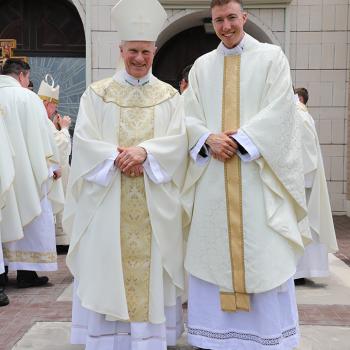Lectionary Reflections
April 10, 2011
John 11:1-45
Fifth Sunday in Lent
Until recently, I have seen this story of the raising of Lazarus as an inaccessible and, in some respects, unappealing story. Lazarus is not fleshed out as a character. All we know about him is that Jesus loved him and he got sick and died. His sisters, whom we have met in Luke's gospel, seem a little passive aggressive. Their initial note doesn't ask Jesus to come. It just informs him of their brother's illness. Then, when he approaches their town, they each, separately, run out and lay the identical guilt trip on him. "Lord, if you had been here, our brother would not have died."
As for Jesus, he is never more certain about the panoramic big picture than here. Lazarus' illness will not end in death, and it will be for the glory of the Son of God. He is, at the same time, seldom more disturbed by the sights and sounds of a specific scene: the sound of mourners wailing and the stench of death.
So for many years, I have read this text and thought hmm, this is odd. And read on.
So much for true confessions. This past week, I have had an epiphany. It is probably one you the reader have already had, and if so, I apologize in advance for pointing out what has long been obvious to you.
The epiphany is that we are to see ourselves in Lazarus and see the miracle of his restoration of physical life as the beginning of our entry into eternal life that begins the moment we accept Jesus' offer of relationship with us.
Lazarus Is Us
The sequence of the Gospel of John is the opposite of the children's game "Show and Tell." It is "Tell and Show." The Prologue tells us that Jesus is the light and life of the world (Jn. 1:4, 5). The giving of sight to the man born blind (Jn. 9) and the raising of Lazarus from the dead (Jn. 11) show us Jesus giving light and life to particular human beings. We are invited to see ourselves in them and him in our lives.
We are to see ourselves in Lazarus, whose name, a shortened form of Eleazar, means "God helps." He is from a town whose name, Bethany, means "House of Affliction." So God helps one who suffers from affliction. John takes a friendship between Jesus and this family and an event that has the quality of reminiscence and shapes it to his theological purpose (Brown, 431). Lazarus is the "one Jesus loves"; he represents all those whom Jesus loves, which includes you and me and all humankind. This story, then, is the story of our coming to life from death in this present moment, not just in a future event.
The Fourth Gospel repeatedly uses the physical realm as a metaphorical pointer to the spiritual realm. Water is a metaphor for the quenching of our spiritual thirst through Jesus' presence; Jesus is the living water (Jn. 4:14). The bread Jesus multiplies to feed the crowd is a metaphor for the satisfaction of our spiritual hunger that Jesus brings; Jesus is the Bread from Heaven (Jn. 6:35). Sight is a metaphor for the spiritual vision and clarity that Jesus brings; Jesus is the light of the world (Jn. 8:12, and chapter 9 where Jesus gives sight to a man born blind). Here, in chapter 11, the restoration of physical life is a metaphor for breaking free from the bonds of spiritual death into the gift of eternal life that Jesus brings. Jesus is the resurrection and the life (Jn. 11:25-6: "I am the resurrection and the life. Those who believe in me, even though they die, will live, and everyone who lives and believes in me will never die.").
Jesus responds to Lazarus' illness with equanimity. He says that "this illness does not lead to death; rather it is for God's glory, so that the Son of God may be glorified through it" (Jn. 11:4). He is not expressing his hope that, because of the miracle he is about to perform, he will be admired and praised. "God's glory" is a reference to Jesus' own resurrection. His raising of Lazarus from the dead will speed his own death, which will lead to his resurrection, in which we all participate.
Convoluted Conversations
The disciples respond to news of Lazarus' illness with indifference. Like most of the people in John's gospel, they operate at the physical, literal level. When Jesus says that Lazarus is "asleep," they don't get that he means he is dead. When Jesus suggests a journey to "wake him up," the disciples question his judgment. After all, if Lazarus is sleeping, they figured that that's a good sign that the worst of his illness has past, and, besides, doesn't Jesus realize the danger that awaits him in Judea? (Jn. 11:8)
Then Jesus resorts to plain speech. "Lazarus is dead." Thomas gets it. He gets that Jesus' raising Lazarus from the dead will speed his own death. "Let us also go, so that we may die with him." (Him refers to Jesus, not Lazarus.)
When Jesus approaches Bethany, another convoluted, miscommunicated conversation awaits him, this time with Martha, Lazarus' sister. She runs out to meet him and lays her guilt trip on him. "Lord, if you had been here . . ." (Jn. 11:21). He replies, "Your brother will rise again." She thinks he means at the last days. The belief in the resurrection of the body had been introduced a couple of hundred years B.C.E. in the Book of Daniel. Espoused by the Pharisees but not the Sadducees, it was widely accepted by the common people of Jesus' day (Brown, 434). So she thinks he is just saying something that people say at funerals to comfort the grieving family.





